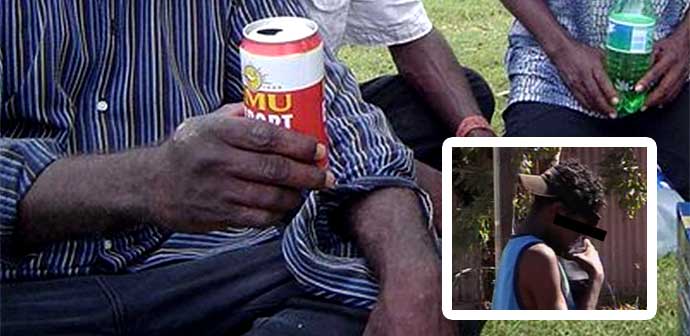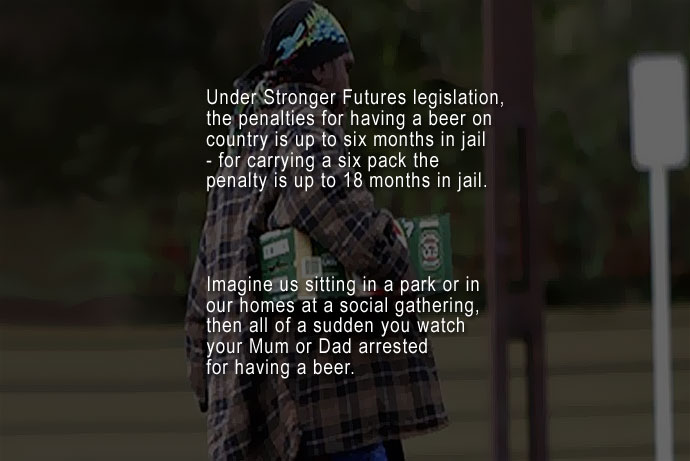Northern Territory Intervention = injustice, prejudice, inequality
Does Australia really need this apartheid like Intervention in the Territory, what legacy will we pay for it? Does Australia really need to have a bloody good look at itself and stop segregating a group of people based on their race?

Mick Estens The Stringer 27 December 2013
Christmas Day 2013 and I am celebrating it with an Aboriginal family in a remote Arnhem community. Kids were running about having fun – new bikes, toys and I got to see my first black superman! We were going to the local spring for a swim and then we cooked up a big feed. We called in at one house and everyone was inside having a beer. In one way or another this was happening at homes all over Australia, but the difference here even though we own the land and have done so forever, Government tells you that you are different to others, the difference is your skin.
On the way to another house, I watched as police pulled up and got out of their car and walked up to two old ladies and took their bags from them. They went through their bags looking for alcohol.
The mother of the kids asked me to drive the car as she didn't want to be 'humbugged' (to be annoyed) by the police. I wouldn't be hassled because as she said to me “you're white”. I drove the car towards the spring and Police did pull me over,- everyone in the car laughed and the kids telling me I was going to jail now, smiling. The police officer on seeing I was a white fella simply said “oh, sorry, you're right” and we drove off. The girl beside me said “this is racism” and I had to agree.
Another boy, a son of an Elder local to the area was pulled over by police for having a green can in his hand – a $184 dollar fine was given out – whether he could afford to pay for it or not. This same man later got stoned on gunga, as gunga is easier to hide from preying eyes. Others sniff petrol to get a high. Ironically, it's not an illegal activity like drinking some alcohol in the said community! One other young man I watched got a random breath test done on him – the strange part was he wasn't in a car, but walking to his Grandmothers to say Merry Christmas. I really was wondering what part of a third world country I was visiting as what I was witnessing on Christmas Day should not be happening in the 'land of the free', a country that has just fought for 12 years for the freedom of the Afghani peoples. But people on their own Country in this nation are ridden roughshod, every indignity. This is the despair of our own Aboriginal people.
In this community police can walk into your home whenever they want if they 'suspect' you have grog, and they do so. A person's home should be their castle.
Despite the many signs telling people grog has been banned in the area, the evidence this side of the Territory's brutal Intervention is nevertheless failing. The signs are everywhere, but people are people. I drive past groups of people forced to drink alone on roadsides, in nearby scant bush, because they cannot in their community. In these conditions consumption will be tinged with lonesomeness, alienation, and therefore binge drinking. The drink becomes companion, rather than social engagement within community mitigating drinking.

Images: ABC News
I pass four crosses where drunks have been run over and killed – two of them this year, a husband and wife forced out onto the road to enjoy a drink and who left their children with Grandparents, only to never return.
It has to be asked what has been achieved in the last seven years of the Intervention. To the youngest child in the photo with this article I am his 'munanga abija' – white Grandfather. The other little child is his Aunty and then there is his Mother. The two youngest have known nothing else other than the Intervention, growing up with others ruling every aspect of their lives while systems of governance, family as Traditional Owners have been stripped of any semblance of dignity – pushed aside.
There is no doubt the Australian Government, whatever political persuasion, paid more attention to their involvement in the Afghanistan War than they ever have to Aboriginal Communities. 12 years of involvement with Afghanistan and 40 deaths of Australian soldiers later, at a cost that Government said was in excess of $7.5 billion, this type of commitment Aboriginal peoples have never known from our Governments. We built 200 schools over there in Afghanistan, trained their military so that they could enjoy what we have, freedom but which many of our Aboriginal peoples still do not have.
The word freedom, we fight hard to give it to others and we have fought in wars all over the globe and have set ourselves on the world stage to discuss. Why don't we do it here, in our nation, for our Aboriginal people?
The 40 deaths of our military personnel are a tragic loss, and these deaths will always be in our minds, in our history books, on town monuments forever, but when the Government deals with the hundreds of Aboriginal suicides, they are quietly swept under a rug.
It is nothing to get a message from a young Aboriginal girl “idaa hanqy mijul dis“(I am going to hang myself) and you start to comprehend the desperation and sense of hopelessness that Aboriginal youth face in the Territory.
In 2011 when the Stronger Futures Bill was floated by Government, Aboriginal Elders from Territory communities voiced their opinions saying “enough is enough”. Government wanted to take away peoples rights when dealing with Aboriginal issues.

See: Creative Spirits for more information on the Northern Territory Intervention and Stronger Futures legislation
The penalties for having alcohol on Aboriginal land was six months in jail – for a can of beer – and 18 months for any amount over 1.3 litres. Imagine us sitting in a park or in our homes in a Queensland, NSW, Victorian suburb, during some camaraderie, then all of a sudden you watch your Mum or Dad arrested for having a beer. Can you imagine this? Sounds Orwellian.
Imagine watching police burst into your suburban home and scour for alcohol, in your fridge, the esky, wherever. Imagine.
The alcohol restrictions Territory communities lead to the criminalising of Aboriginal peoples. They lead to the isolation of Aboriginal people. The risk taking for bringing in a stack of tinnies has led to the risk taking for 'harder' liquor snuck in. Green cans is replaced by rum. Gunga and petrol sniffing replacing them, less risk taking, an easier option when having to deal with boredom and despair, lonesomeness and alienation, with the sense of powerlessness and indignity.
The week before I travelled for my Arnhem Christmas, I was with an Aboriginal man in Darwin going to a meeting. We got to some accommodation and he went inside to organise the room while I parked the car. A few minutes later he was walking towards me swearing and saying we have to keep looking. I asked why and he told me he was told by my friend at the motel that because he was black he had to cough up a $200 bond for the room. I had often stayed at the same place and never before had I been asked for a bond. This is racism. We went and found different accommodation but this time he stayed in the car while I completed the booking. To have been humiliated again would have been too much for him.
Does Australia really need this apartheid like Intervention in the Territory, what legacy will we pay for it? Does Australia really need to have a bloody good look at itself and stop segregating a group of people based on their race?
 The media and the Intervention
The media and the Intervention
 The great lie still underpins Indigenous policy
The great lie still underpins Indigenous policy
 Specialist doctor quits NT alcohol rehabilitation program in protest
Specialist doctor quits NT alcohol rehabilitation program in protest
 Don't take our lands - Yami Lester
Don't take our lands - Yami Lester
 $25.4 billion spent on Aboriginal disadvantage is a lie
$25.4 billion spent on Aboriginal disadvantage is a lie
 'Close the Gap' quick-fix policy - FAILED
'Close the Gap' quick-fix policy - FAILED
 NT First Nations leader calls for rejection of lease deals
NT First Nations leader calls for rejection of lease deals
 No leases - No oil and gas exploration: clans say
No leases - No oil and gas exploration: clans say
 Major uranium leak endangers Kakadu – but played down
Major uranium leak endangers Kakadu – but played down

